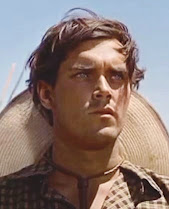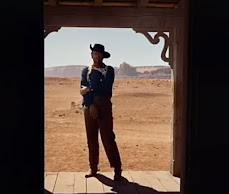 |
| John Wayne as Ethan. |
John Wayne stars as Ethan Edwards, a former Confederate soldier who has returned to his brother Aaron's Texas home three years after the end of the American Civil War. Ethan is vague about a lot of things, especially the newly minted dollars that he gives his brother for room and board. He is also racist toward Indians, as indicated by his wary attitude toward Martin, Aaron's adopted son, who is 1/8 Cherokee.
When a neighbor's bull is killed by a band of Comanches, Ethan and Martin (Jeffrey Hunter) join a Texas Ranger-led party to pursue the Indians. However, the killing of the bull turns out to be a ruse to lure most of the men away from Aaron's ranch. By the time Ethan and Martin return home, the Comanches have killed Aaron and his wife Martha and burned the ranch. Ethan's nieces, teenage Lucy and eight-year-old Debbie, are missing and assumed to have been taken by the Comanches.
 |
| Jeffrey Hunter as Martin. |
The Searchers is many things, but it works best as a character study of Ethan. At the start of the film, he is a man without purpose who has ignored his only family. Since the end of the Civil War, he has apparently wondered aimlessly, fighting in the Franco-Mexican War and perhaps even turning to robbery. He clearly harbors secret feelings for Martha, his brother's wife, stealing glances at her when he comes to visit. He envies Aaron's life despite knowing that he would not be good at it. Still, it's an idealized existence that he feels compelled to pursue and his niece Debbie represents all of that: a loving wife, a family, a home, a legacy. To be sure, Ethan wants to rescue Debbie and Lucy at the beginning. But he is too much of a realist to truly believe that--as the years pass--he and Martin stand a chance of finding Debbie.
The key relationship in The Searchers is the one between Ethan and Martin. The latter represents a mirror to Ethan, allowing the older man to see his darker side. Martin expresses shock when the pragmatic Ethan shoots bad men in cold blood. Martin leaves the woman he loves because he says he's concerned what the racist Ethan might do if he finds Debbie has become a Comanche. It's not just Debbie's safety that concerns him; Martin fears for Ethan's soul. It's a credit to screenwriter Frank S. Nugent that the Ethan-Martin relationship avoids a father-son angle. Rather, Martin slowly earns Ethan's respect--which is not something the older man gives freely--and the two come to rely on one another.
 |
| Ford shows Ethan's isolation by framing him in several scenes. |
I think I might have liked The Searchers more if the film's structure embraced Ethan's focused pursuit. Unlike Ethan, The Searchers wanders away from its compelling character portrait and introduces a love story for Martin and peppers the plot with typically quirky John Ford characters: Lars Jorgensen, a Swedish immigrant; Samuel Clayton, a Texas Ranger and a traveling preacher; Mose Harper, an eccentric in search of a rocking chair by the fire, and the singing Charlie McCorry.
I'll diverge from the general critical and popular opinions that The Searchers is one of the greatest films ever made. It's an exceptionally well-made movie with some first-rate performances, but it could have benefitted from tighter story-telling and an ending that feels less rushed.








As you know, modern view is Debbie's his daughter. Intensifying his hatred and forgiveness.
ReplyDeleteThe Searchers was the first time we got Duke as a troubled anti-hero. I think. Not his first nuanced role however. The colorful Ford stock-company oddities don't bother me because without a broad social context there's no point to the story.
ReplyDelete